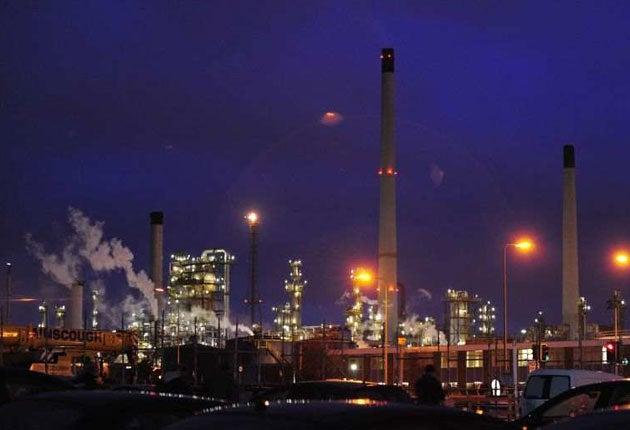Foreign workers 'did not undercut locals'
Inquiry rejects claims oil refinery bosses broke law over hiring of European staff

Your support helps us to tell the story
From reproductive rights to climate change to Big Tech, The Independent is on the ground when the story is developing. Whether it's investigating the financials of Elon Musk's pro-Trump PAC or producing our latest documentary, 'The A Word', which shines a light on the American women fighting for reproductive rights, we know how important it is to parse out the facts from the messaging.
At such a critical moment in US history, we need reporters on the ground. Your donation allows us to keep sending journalists to speak to both sides of the story.
The Independent is trusted by Americans across the entire political spectrum. And unlike many other quality news outlets, we choose not to lock Americans out of our reporting and analysis with paywalls. We believe quality journalism should be available to everyone, paid for by those who can afford it.
Your support makes all the difference.An independent inquiry into the use of "foreign workers" at the Lindsey oil refinery has rejected claims that the wages they were paid undercut British employees.
Acas, the arbitration service, has also found no evidence that the law was broken when a subcontractor hired workers from Italy and Portugal.
The move caused a walkout last month at Total's refinery in Lindsey, Lincolnshire, and a wave of wildcat strikes across Britain, as Gordon Brown came under pressure to honour his 2007 pledge to create "British jobs for British workers". Acas, whose report on the dispute will be published today, is reluctant to "take sides" and will acknowledge genuine trade union concerns about jobs going to foreign workers.
But the lack of evidence of wages being undercut at Lindsey will be seen as a setback for unions. They have accused companies of seeking "cheap labour" by paying foreign workers less than required under Britain's industry-wide agreements between employers and unions on pay and conditions.
The Acas findings may allow employers to put the spotlight on allegations that poor productivity among British workers persuades some firms to recruit from the continent. "This is not about pay, it is about productivity," one industry source said yesterday.
There are claims that IREM, the Italian subcontractor that hired Italian and Portuguese workers at the refinery, won the £200m construction contract after a British firm, Shaw, pulled out because it feared poor productivity would make it unprofitable.
Today the Business Secretary, Lord Mandelson, and the Skills Secretary, John Denham, will announce a study of skills and productivity to ensure British firms win as many engineering construction contracts at home and abroad. It will be led by Mark Gibson, director general of business support in Lord Mandelson's department.
Unions say the European Union's directive on workers posted abroad allows employers to pay less to foreign workers than their British counterparts. The directive says posted workers should not receive less than the law requires – in Britain, the national minimum wage – but unions want it beefed up to include more generous industry-wide agreements. Many Labour MPs are sympathetic to the demands.
But ministers claim unions want to use the controversy to win a legal right to strike, without the threat of being sued for damages, to uphold industry agreements.
Ministers say that would mean a fundamental change to the industrial relations laws that were brought in by Margaret Thatcher. The Government has promised to consider the issue after the EU has reviewed the workings of the directive.
The strike at Lindsey was called off after Total agreed that about 100 jobs would go to British workers.
Join our commenting forum
Join thought-provoking conversations, follow other Independent readers and see their replies
Comments